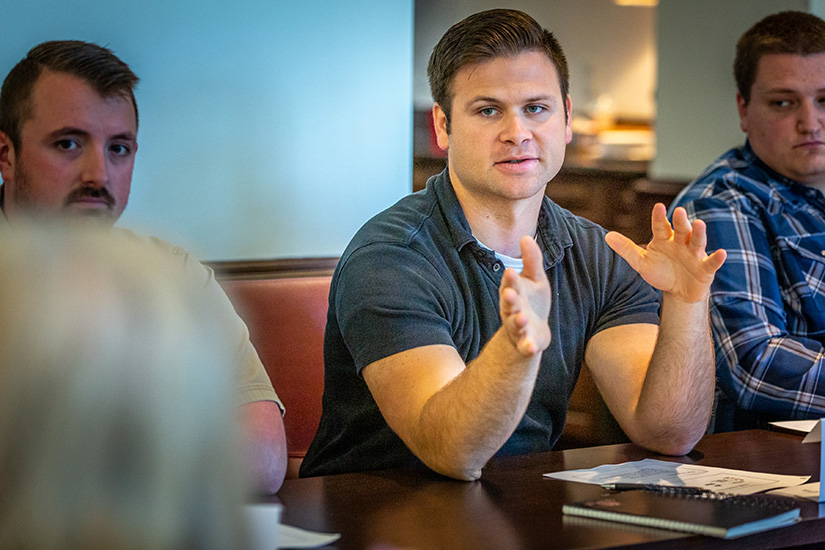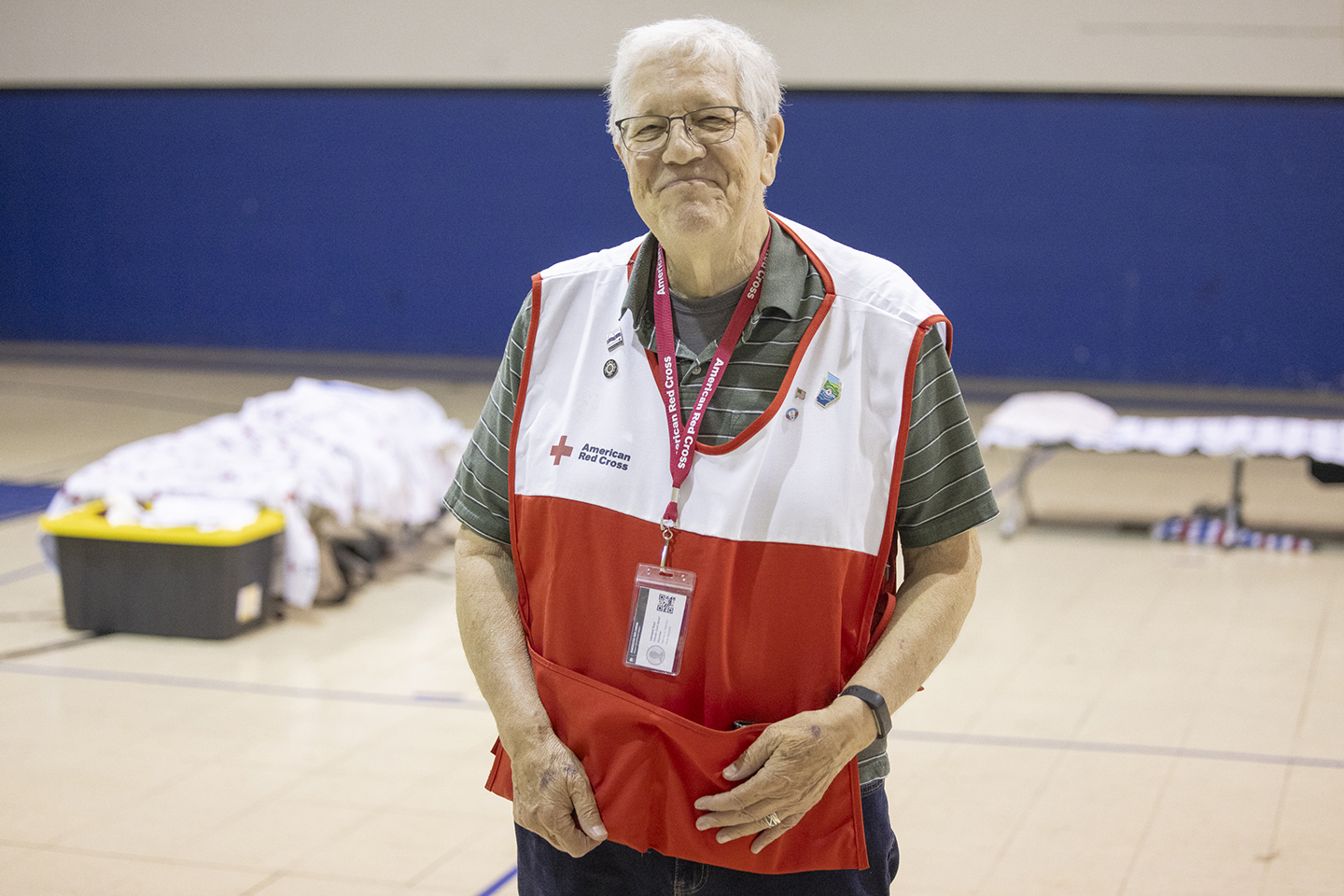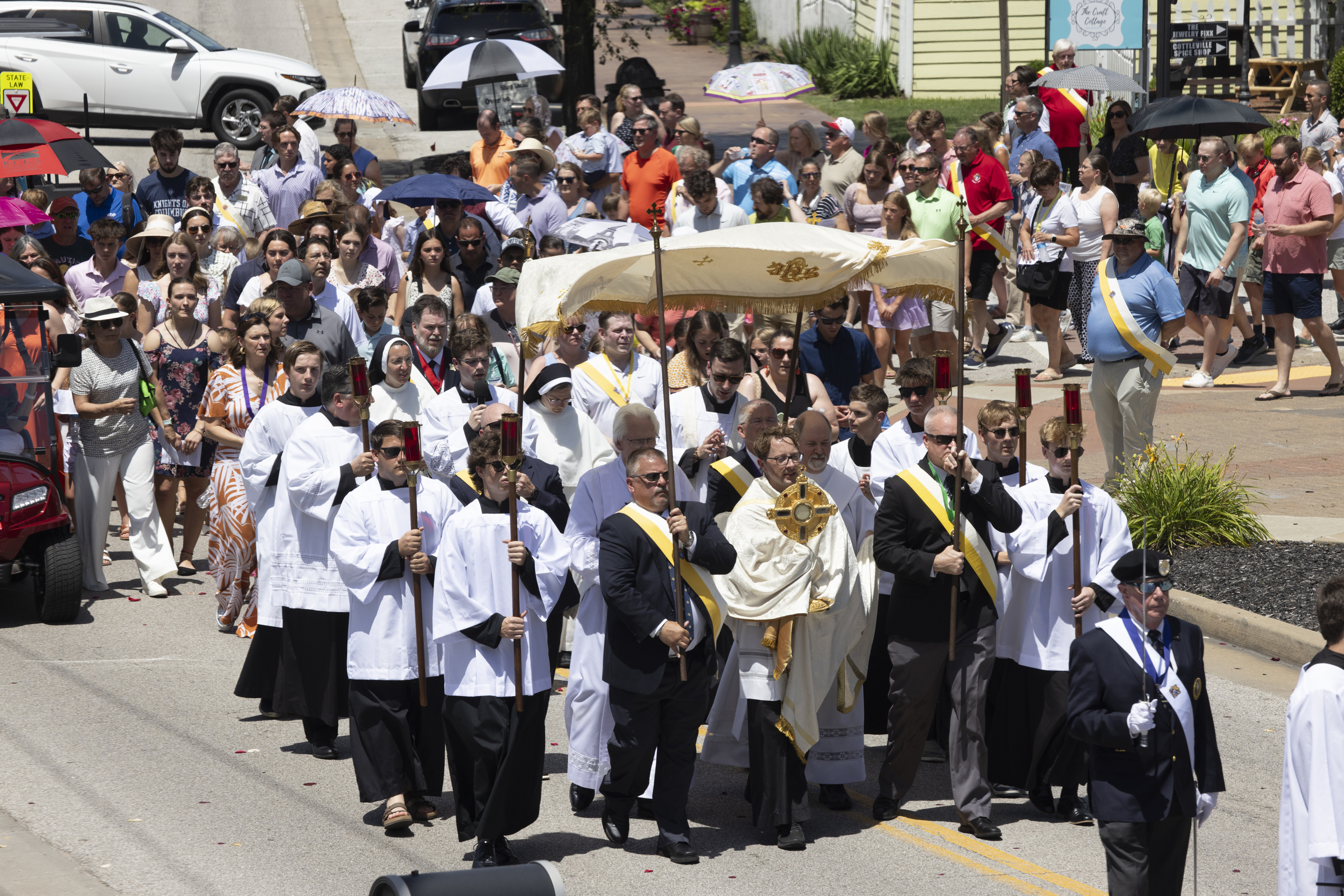Summer program at Kenrick-Glennon Seminary helps incoming theologians with spiritual, human formation goals

Four-week intensive program designed to help incoming theologians, formators learn more about each other
The summer months at Kenrick-Glennon Seminary are generally quieter, with seminarians out in the field on various assignments. But on a recent morning, a group of men were spread out in a conference room, discussing topics such as healthy relationships and personality traits.

Alex Shannon, a seminarian from St. Louis, shared how he became involved in evangelizing to others as a college student. “But this identity that I was trying to live out of was not from the relationship of being a beloved son” of God, he said. “It was like I was treating it as a hobby that I’m good at, and I was living out of that (Catholic) worldview rather than living out of a relationship” with the Lord.
With affirming nods and “mm-hmms,” Shannon’s revelation led to a deeper conversation about overcoming the mindset that they have to have a perfect life in order to become a priest.
A new summer program at Kenrick-Glennon Seminary is helping seminarians and seminary formators to get to know one another better on the spiritual and human levels — and more importantly how that factors into their formation, and ultimately their future ministries as priests.
“It seems to me that you may be thinking to yourself, I do not have this stuff figured out — this is not the place for me,” said Ed Hogan, Kenrick-Glennon’s academic dean. “Gentlemen, let me just expose that as a lie. The question is not whether you have this figured out; the question is whether or not you’re willing to work on it. There’s always stuff to be worked on. … but the prerequisite for you to help other people in pastoral ministry to work on their stuff, is that you be working on yours.”
The four-week intensive program held in June addressed the spiritual, human and intellectual formation needs of men who will be entering Kenrick School of Theology in the fall. The program includes an eight-day retreat designed to give the men a space to see how the Lord is speaking to them. It also introduced topics on interiority, personal and trinitarian prayer and rules for the discernment of spirits.
Seminary administrators said the program is helping decrease the time that normally would have been spent in the fall getting to know the men and their personalities.
“Through prayer and experience, we have guys come into Theology I with various colleges and pre-theologates, and with 125 guys in the house, it was very hard to get to know the man, and to know what the formation needs were,” said president-rector Father James Mason. “There was a desire to have a man begin formation right when they get here, and not spend a semester or two trying to discover that.”

With the guidance of their formation advisers, seminarians will set spiritual and human formation goals. But the goals aren’t approached from a self-improvement mindset, which can be isolating; rather, they’re aligned with a sense of being in communion with Jesus. With these goals in mind, the seminarians will be ready to hit the ground running in the fall.
“It might take on a specific form in terms of their family history or mood history, or whatever is going on in their lives,” said Father Paul Hoesing, vice-rector for formation. “They’re able to articulate a goal that comes out of the retreat, because Jesus wants this, because I want this — and these are the means that will assist me in cooperating with Jesus.”
Seminary administrators said that this type of program is a new concept, and Kenrick-Glennon is the only seminary in the United States believed to offer something like this, said Father Mason. They also had to sell the idea to other dioceses who send men to St. Louis for formation, knowing that it would cut into their summer assignments. But the seminary is already seeing the benefits.
A desire for control is a topic that seminarian Jake Rosenmeyer identified as something he’d like to work on. “The last two years, I realized I’ve had this desire to control everything” in his life, said Rosenmeyer, who is from the of the Diocese of Sioux City, Iowa. “But (God) is the one who is in control. How can I continue to know God is in control in the midst of my earthy responsibilities?
The seminary “has us cooperating together with the Holy Spirit, and not faculty looking for something wrong with you,” Father Hoesing said. “All we’re interested in is, are we listening to God together? And are we moving with God in our stuff?”
>> Fall enrollment
Kenrick-Glennon Seminary is expected to welcome 125 men to the seminary when classes begin this fall. Of that number, 22 dioceses are represented, with 93 at Kenrick School of Theology and 32 at Cardinal Glennon College.
The overall number is slightly down from previous years, which is on par with a nationwide trend, said Father Paul Hoesing, vice-rector for formation. Contributing factors have included a larger class (18) of transitional deacons that graduated this year, coupled with smaller entering classes. Many dioceses are also are seeing a small dip in applicants, because of decreased or cancelled visits to seminaries due to the pandemic.
“Seminary visits are a vital way to assist a man discerning,” said Father Hoesing.
Father Hoesing noted that the seminary places its priority on guiding men as they listen to God’s call for their lives.
“If a man attempts to and becomes a priest without a real, durable and lived capacity to listen to God, we are in trouble and the men understand this concern for our shared mission,” he said. “The discernment is about readiness … In charity and justice, the men want to be morally certain and ready for the vocation.
Kenrick-Glennon Seminary is supported by the Annual Catholic Appeal.
The summer months at Kenrick-Glennon Seminary are generally quieter, with seminarians out in the field on various assignments. But on a recent morning, a group of men were spread out … Summer program at Kenrick-Glennon Seminary helps incoming theologians with spiritual, human formation goals
Subscribe to Read All St. Louis Review Stories
All readers receive 5 stories to read free per month. After that, readers will need to be logged in.
If you are currently receive the St. Louis Review at your home or office, please send your name and address (and subscriber id if you know it) to subscriptions@stlouisreview.com to get your login information.
If you are not currently a subscriber to the St. Louis Review, please contact subscriptions@stlouisreview.com for information on how to subscribe.







